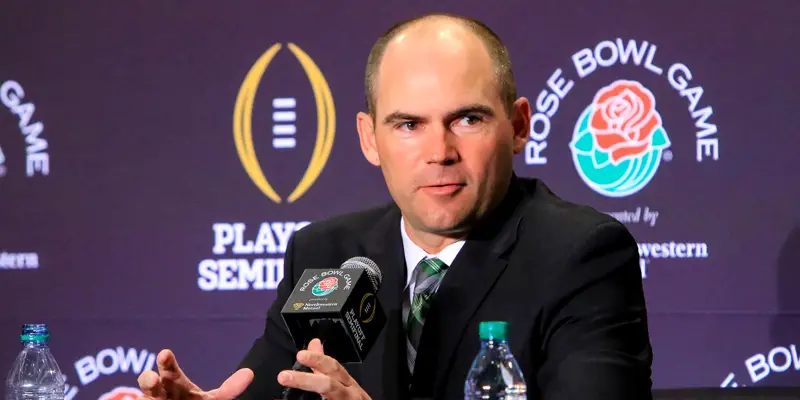Twenty-one Power Five coaches won nine regular season games in 2015. Nineteen of those coaches are back with the same school this season. Of the two coaches not returning, one is Art Briles, formerly of Baylor, who was fired not for how his team’s on-field performance, but rather his team’s horrifying behavior off of it.
The other nine-win coach who was fired was Mark Richt, who had won 74% of his games, along with six division titles and two conference titles. His teams played in three BCS bowls, finished ranked in the Top Ten eight times, including second to end the 2007 season. He was the winningest coach by percentage in school history and second in wins but found that didn’t matter as his school fired him the day after the 2015 regular season.
Richt was replaced because that school he was coaching at was Georgia, and at the risk of stating the obvious, Georgia had decided that his productivity was unacceptable, even if that productivity was nine wins or more in 11 of his 15 seasons. By hiring Kirby Smart as his replacement, it appears Richt’s greatest sin was not being Nick Saban, and the roll of the dice on a Saban assistant was worth pushing out a 15-year coach.
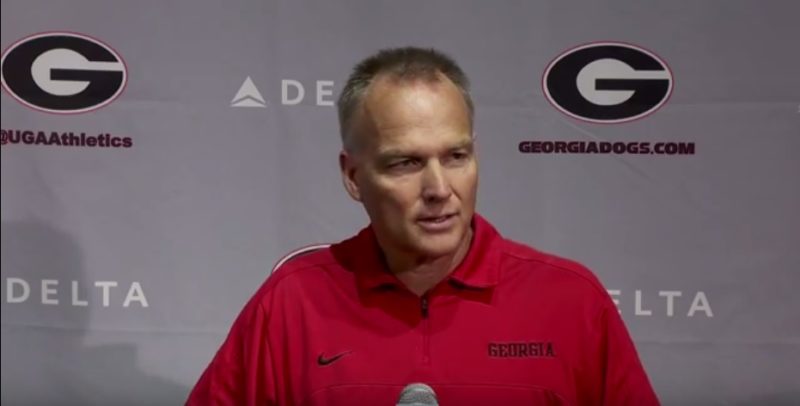
Mark Richt was at Georgia from 2001-2015.
The common refrain when a coach is fired is “he didn’t win enough.” That statement can’t be applied to Richt in terms of wins and losses; only three active coaches with 10 years of experience at the Power Five level had a better winning percentage than Richt: Urban Meyer, Bob Stoops and Saban; between them a combined eight national championships.
What doomed Richt wasn’t that he didn’t win a national championship during his 15 years at Georgia; Stoops didn’t win any titles either over the span of Richt’s tenure, it was the perception that he no longer provided a reasonable enough chance at one for Georgia to retain him.
While Richt was the only coach with nine regular season wins last season let go primarily for on-field reasons, of the 19 other coaches returning, arguably no coach has faced more offseason scrutiny than Mark Helfrich.
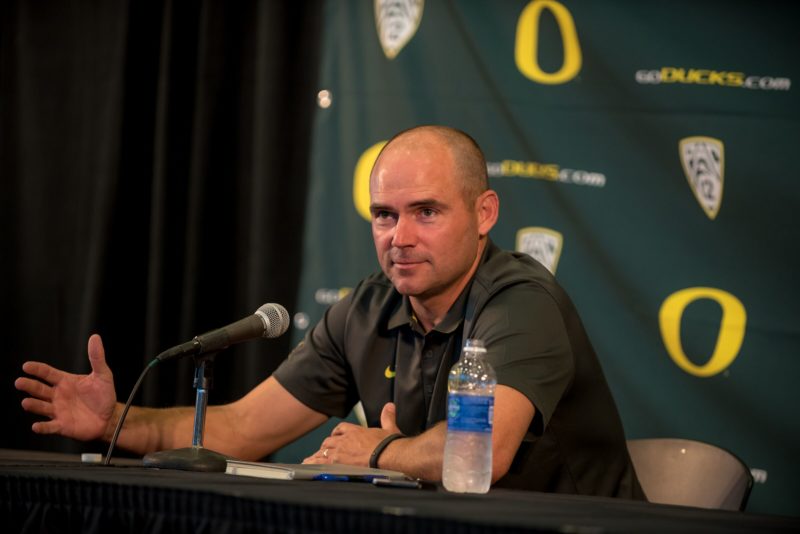
Mark Helfrich answers questions at Media Day.
By objective standards, Helfrich should be as comfortable as any coach in college; few coaches have had more success in their first three years than Helfrich. He has won more than 80% of his games, and only four active FBS coaches have a higher winning percentage at the FBS level.
He is the youngest active FBS coach to have led his team to the National Championship Game. He has averaged 11 wins per year and done so at a school that achieved that many wins in a single season for the first time all the way back in … 2001. He has matched many of the achievements of his predecessor, a predecessor who raised the bar for success higher than any coach in school history no less – playing for a national championship, winning a Rose Bowl and coaching the school’s first Heisman Trophy winner.
Yet the one achievement of his predecessor that he has not matched: three conference championships in his first three years.
While it is an extremely ambitious achievement to expect realistically from any coach, why that achievement wasn’t matched has been the source of much handwinging. Conference titles were missed in 2013 and 2015, not by losing a key matchup to the eventual conference champion that rendered the rest of conference schedule moot, as that which clipped the Ducks in 2012, but by being in position to win the conference championship regardless of the outcome of the Oregon-Stanford game but not being able to do so.
The Ducks have lost only eight games the past three seasons, but when the losses have come, they have been rough – consecutive losses to unranked Arizona teams. The worst loss at Autzen Stadium in 38 years. Losing to Washington State in Eugene for the first time in 12 years by being unable to hold on to a 10-point lead with less than four minutes remaining, causing Oregon to miss out on its first chance to play in consecutive Rose Bowls in school history. In its bowl game, it was unable to win an exhibition game against a local opponent, which is way more pleasant than saying Oregon allowed the biggest comeback in the 114 year history of college football bowl games.
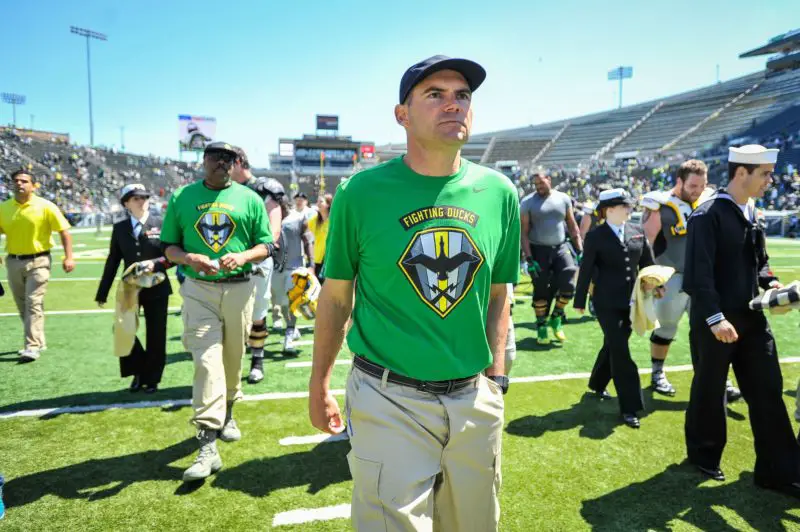
Mark Helfrich at the Spring Game.
The most challenging aspect of being the head coach at Oregon is the unique expectations of fans. Many fan bases are challenging to deal with due to the wildly inflated, win-or-else demands placed on their teams. Because of Oregon’s position in the college football landscape as a program of recent success, there is the sustained perception from college football’s traditional powers of the Ducks being an interloper amongst the elites; that their success is fleeting and that Oregon’s position won’t be “normal” again until it returns to mediocrity.
Conversely, Oregon fans feel they will never be respected by those powers until they win a national championship. For Duck fans, winning as a result is second to what it symbolizes: that the Ducks belong. Until a title is won, the demand will always remain the same: never give any indication of permanent regression.
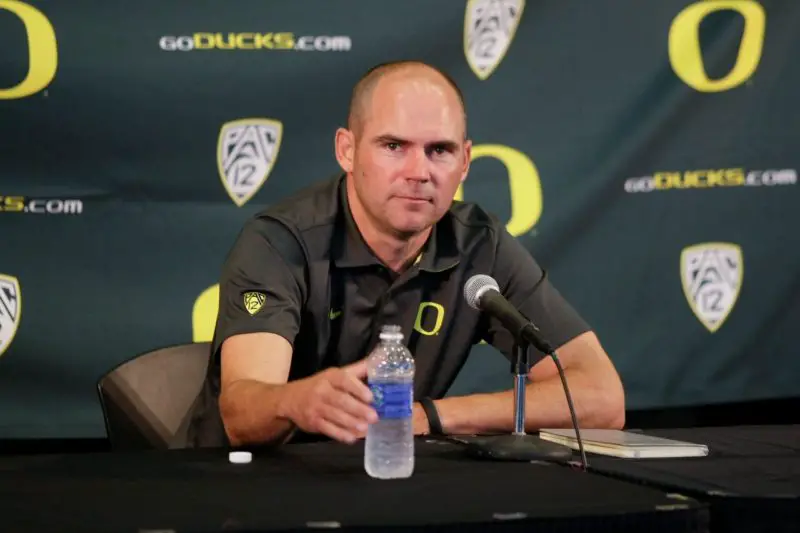
Mark Helfrich answers questions from the media.
Vegas has Oregon’s over/under for wins in 2016 set at 8.5. After winning 13 in 2014, and nine last year, if Oregon hit the under, it would not only mark their fewest wins by the Ducks in a decade, it would mean a second consecutive year of fewer wins than the prior season. The last time the Ducks decreased their win totals in two consecutive seasons? 1973.
All that is on the line for 2016 is either a return to recent success, or a regression unseen since the dark ages of Oregon football. The stakes are high, but every time Mark Helfrich has faced public doubt, that’s when he has done his best work.
Can he do it again? We will find out a week from Saturday.
Top photo by John Sperry
Related Articles:
Oregon Football: Early 2026 Ranking Projections
FishDuck Foaming Over Upside of 2026 Diamond Ducks
Unbelievable...Same SEC Stuff, Different Day
Why Oregon Football Always Belongs in the National Conversation
The B1G Won the 2026 Coaching Carousel...Big-Time!
Continuity? Lanning's Hiring Success is Put to the Test
Nathan Roholt is a senior writer and managing editor emeritus for FishDuck. Follow him on Twitter @nathanroholt. Send questions/feedback/hatemail to nroholtfd@gmail.com.

